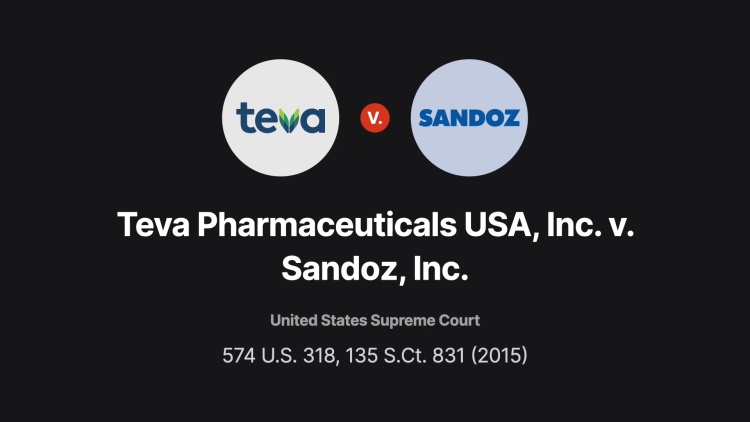Teva Pharmaceuticals USA, Inc. v. Sandoz, Inc.
United States Supreme Court
135 S.Ct. 831 (2015)
- Written by Samantha Arena, JD
Facts
Teva Pharmaceuticals USA, Inc. (Teva) (plaintiff) owns a patent directed to a manufacturing method for a multiple sclerosis drug. The patent describes the drug’s active ingredient as having a “molecular weight of five to nine kilodaltons.” Sandoz, Inc. (Sandoz) (defendant), attempted to market a generic version of the drug. Teva brought a patent infringement suit against Sandoz. Sandoz contended that the patent was invalid because the description of the molecular weight was insufficiently definite, in violation of 35 U.S.C. § 112, because Teva did not explicitly state which of three potential methods was used to calculate the value. After hearing expert testimony from both Teva and Sandoz, the district court determined that the patent met the definiteness requirements and was therefore valid because a skilled artisan would have understood that “molecular weight,” as referred to in the Teva patent, meant molecular weight as calculated by the peak average method. Sandoz appealed. After reviewing each of the district court’s legal and factual determinations de novo, the United States Court of Appeals for the Federal Circuit (Federal Circuit) reversed, finding that the term “molecular weight” was indefinite. Teva filed a petition for certiorari, contending that the Federal Circuit employed the wrong standard of review. The United States Supreme Court granted the petition.
Rule of Law
Issue
Holding and Reasoning (Breyer, J.)
What to do next…
Here's why 899,000 law students have relied on our case briefs:
- Written by law professors and practitioners, not other law students. 47,000 briefs, keyed to 994 casebooks. Top-notch customer support.
- The right amount of information, includes the facts, issues, rule of law, holding and reasoning, and any concurrences and dissents.
- Access in your classes, works on your mobile and tablet. Massive library of related video lessons and high quality multiple-choice questions.
- Easy to use, uniform format for every case brief. Written in plain English, not in legalese. Our briefs summarize and simplify; they don’t just repeat the court’s language.





